Rank Math Analytics helps you track the performance of your content in search and keep an eye on which posts are performing well as well as which of them require attention.
The overall idea of the Rank Math Analytics feature is to provide you with an overview of your current SEO standing and your immediate SEO progress. You can easily view your website’s current state with respect to organic traffic with the help of this feature.
This is how the dashboard of Rank Math analytics looks like:
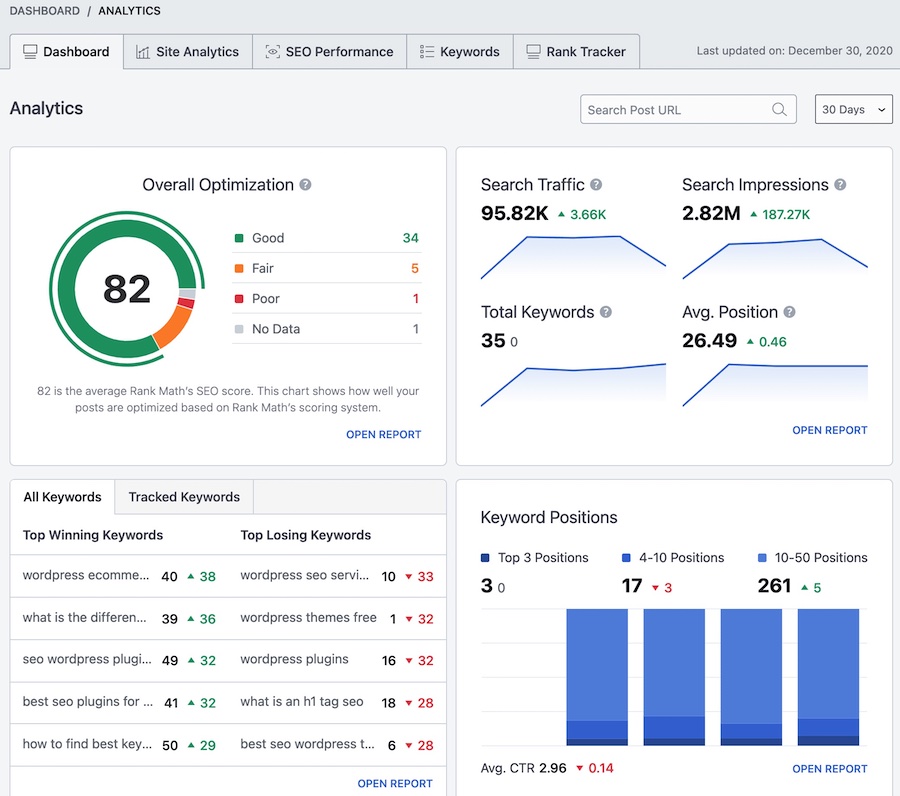
To take advantage of this Rank Math Analytics feature, you should connect Rank Math with Google Analytics. And in this knowledgebase tutorial, we’ll walk you through how to connect Rank Math with Google Analytics 4.
1 Connect Rank Math With GA4 Property
Rank Math can create a new GA4 property on behalf of you. To create a new GA4 property, follow the steps described below.
1.1 Navigate to Analytics Settings
Start by heading to WordPress Dashboard → Rank Math SEO → General Settings → Analytics.
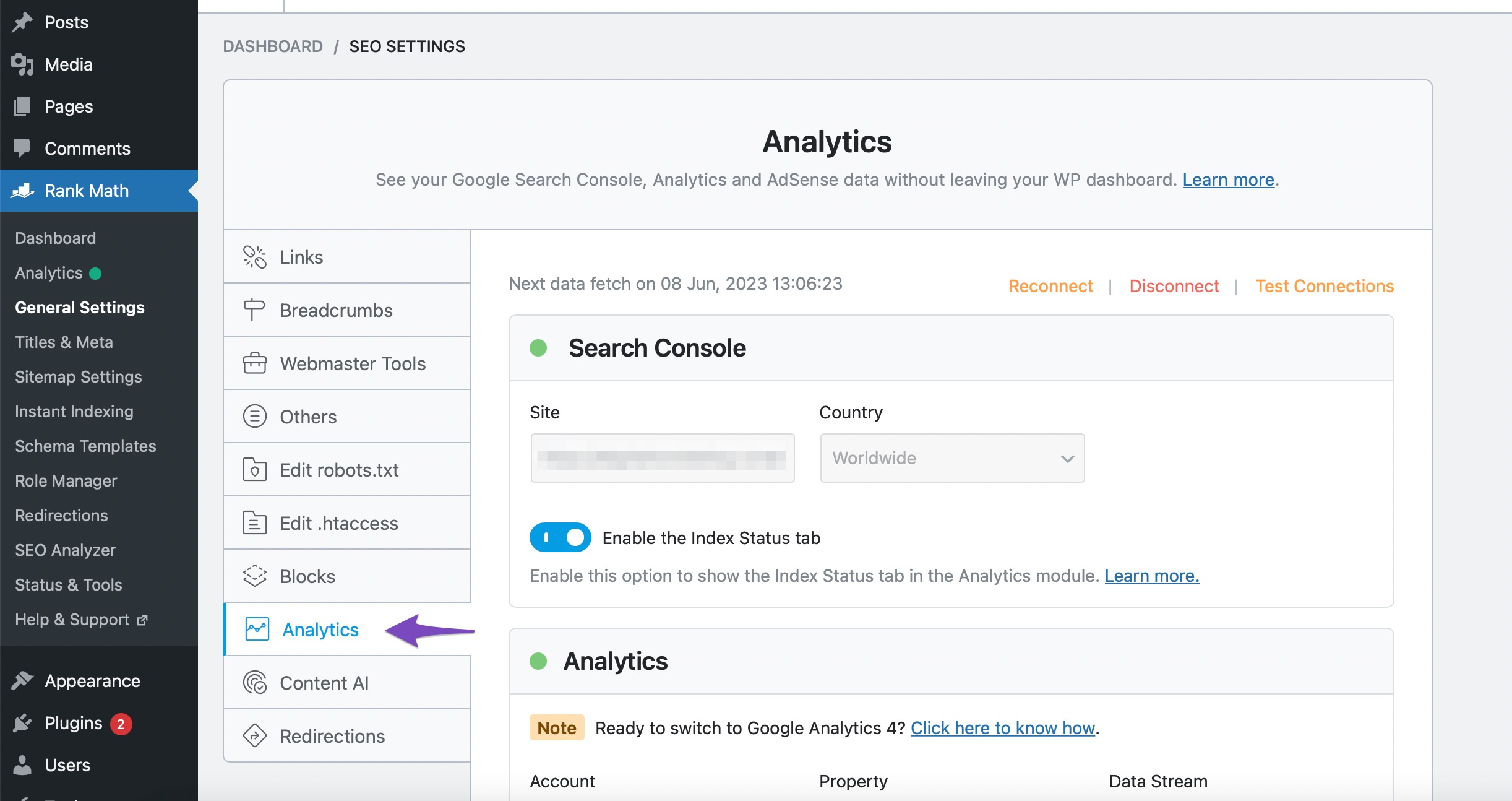
In the Analytics settings, ensure that you’ve connected Rank Math with Google Analytics as we’ve walked through in this knowledgebase tutorial.
1.2 Create New GA4 Property
Note: In case, you’ve already created a GA4 property, then you can ignore this step.
Then under the Analytics section, click the Property dropdown as shown below and choose the Create new GA4 Property option.
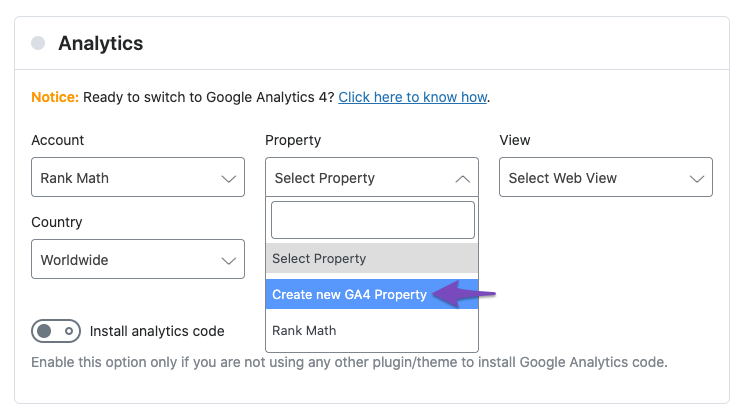
Once you select this option, you’ll see a prompt asking for your confirmation to create a new GA4 property. Click OK.
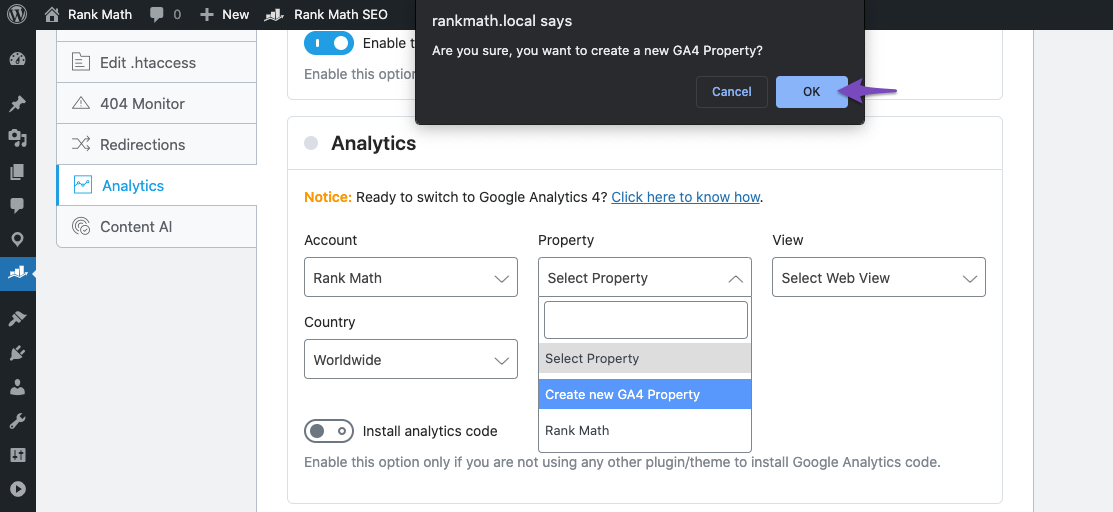
1.3 Select the GA4 Property to Connect
Within a few moments, the newly created GA4 property will be automatically selected in the Property drop-down.
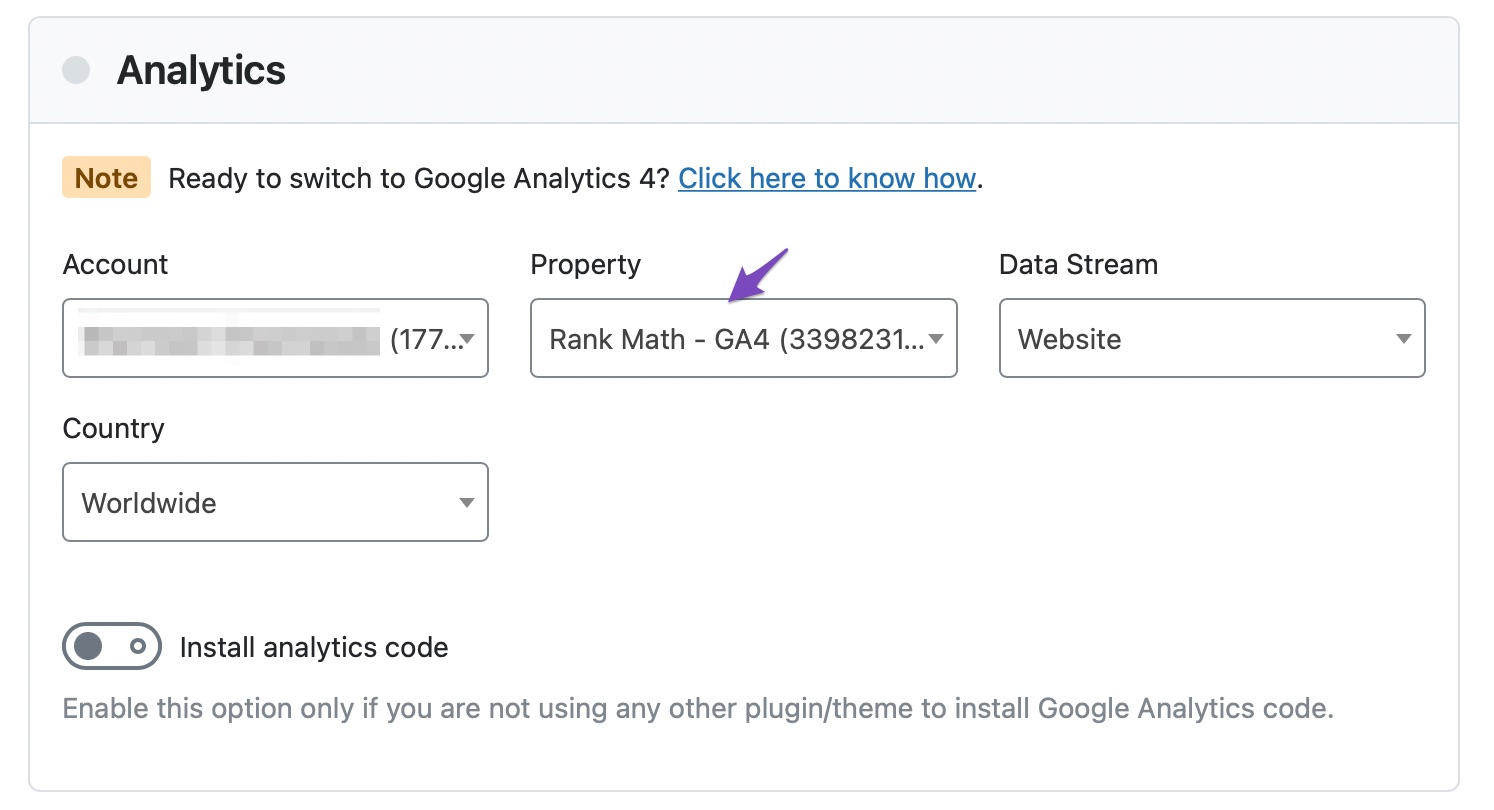
Alternatively, you can choose any existing GA4 property from the Property dropdown.
Please note that all the GA4 properties are clearly indicated with a suffix -GA4.
1.4 Select Data Stream and Country
In the Data Stream dropdown, select the data stream for the GA4 property. For the newly created GA4 property, Rank Math would have automatically created the Website data stream.
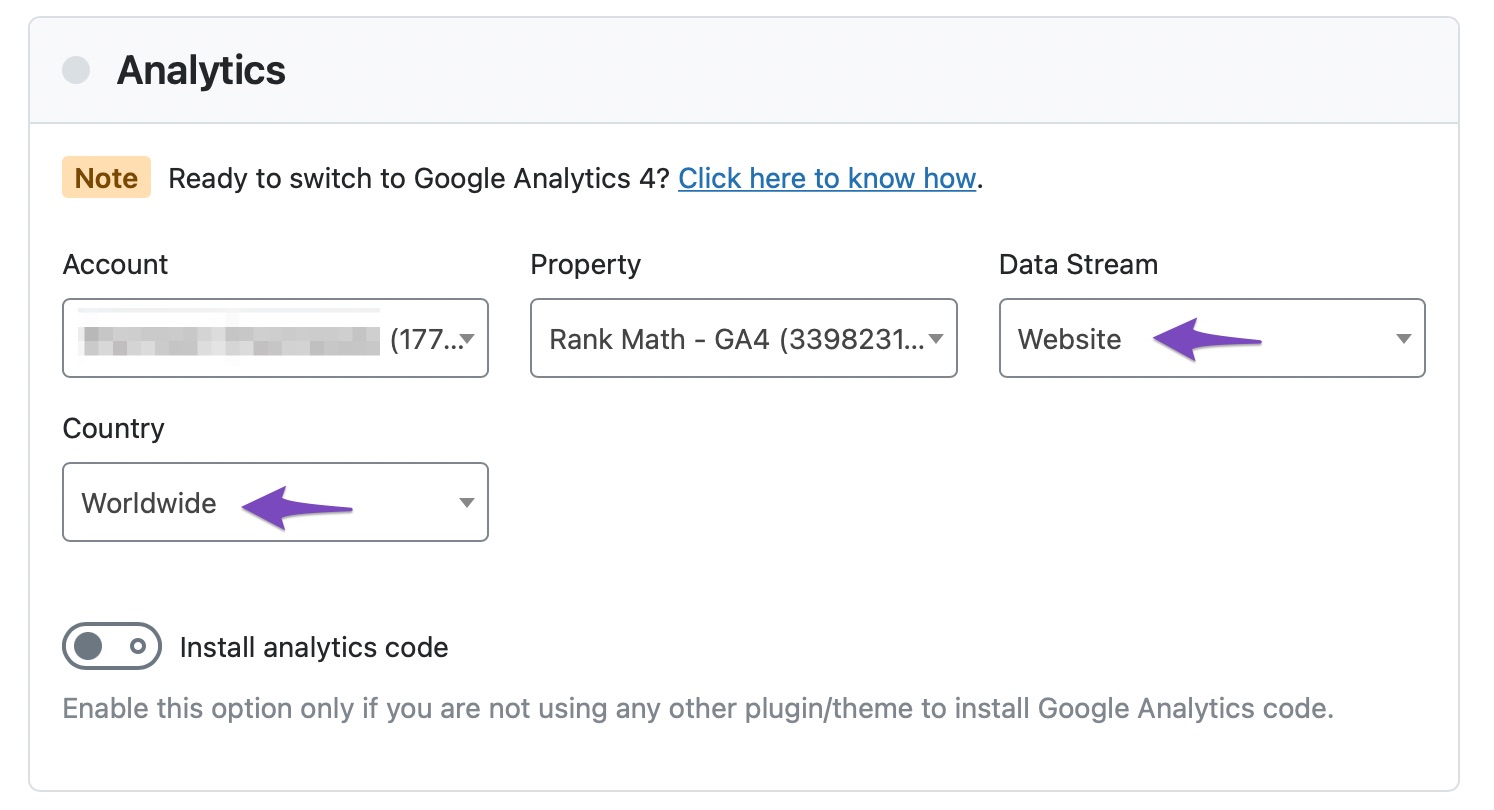
Under the Country dropdown, you can either leave with the default Worldwide or choose a preferred country of your choice to fetch the Analytics data for.
1.5 Install Analytics Code
Now that you’ve configured Rank Math to retrieve data from the GA4 property, you need to make sure that you’ve got a plugin or theme adding the GA4 tracking code so that all the pageviews and events on your site are recorded in the Google Analytics.
If the Google Analytics 4 tracking code is not added to your site by any other means, then you can enable the toggle to Install Analytics Code.
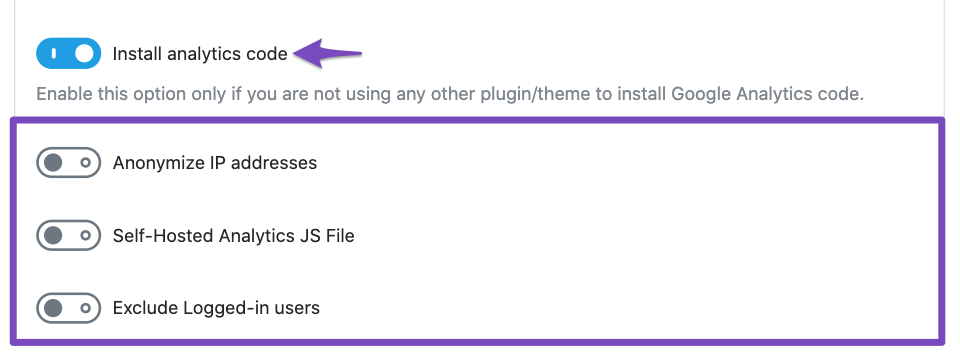
Once you enable the toggle, you’ll see other analytics options that you can enable such as Anonymize IP addresses, Self-Hosted Analytics JS File and Exclude Logged-in users.
1.6 Save Changes
Finally, you can click the Save Changes button at the bottom of the page.

To validate that Rank Math has added the Google Analytics 4 code, head over to your website’s page source code. You can search for a code of the below format to ensure that Rank Math has successfully added the Google Analytics 4 code.
gtag('config', 'G-xxxxxxxx', {} );Note: For a newly created property, it will take a few hours to collect and display the initial data in Google Analytics. Rank Math will import that data from Google Analytics and makes it available on your Analytics dashboard on the next scheduled data import. If your Analytics setting disappears after you save your changes, consider switching to Google Chrome or another Chromium-based browser.
2 Connect Rank Math With Universal Analytics Property
Rank Math still supports Universal Analytics (GA3) and, if you prefer to create a GA3 property and start measuring your site performance, you can easily do that with the following steps.
Note: As of July 1, 2023, Google has stopped processing Universal Analytics data in favor of Google Analytics 4. Hence you’ll not be able to track your visitors using Universal Analytics anymore. We encourage you to follow the above steps to measure your site performance using GA4.
2.1 Navigate to Google Analytics Admin
First, go to your Google Analytics → Admin.
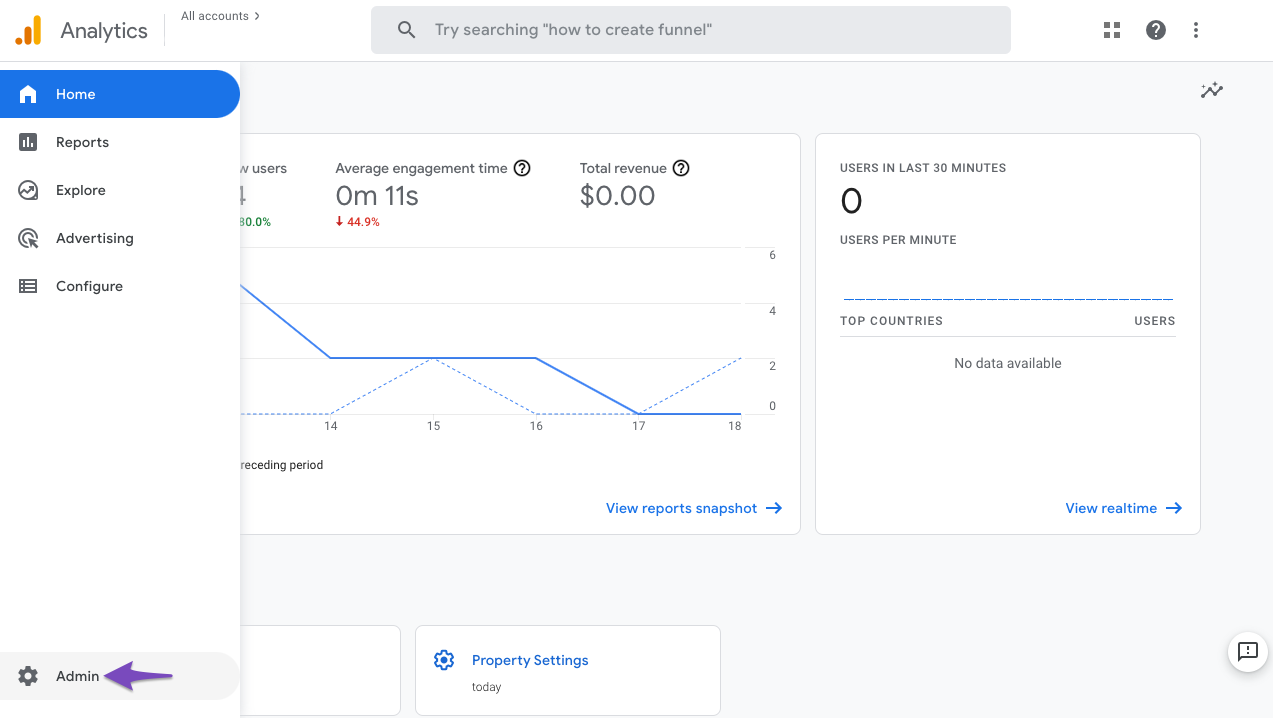
2.2 Create New Property
Then click on Create Property.
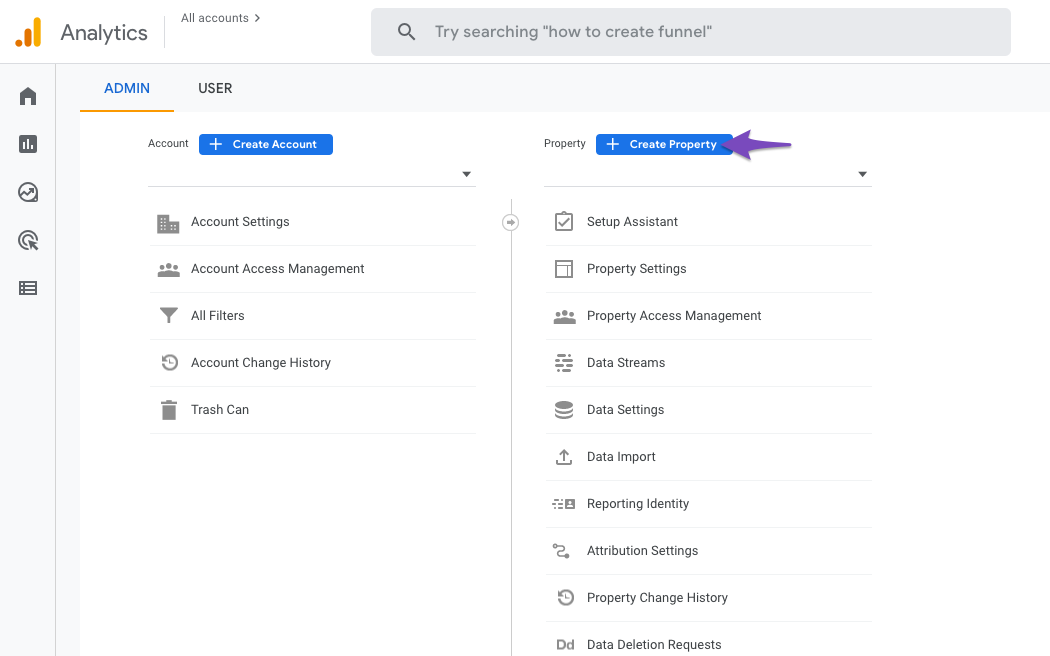
Give a name to your property in the Property Setup.
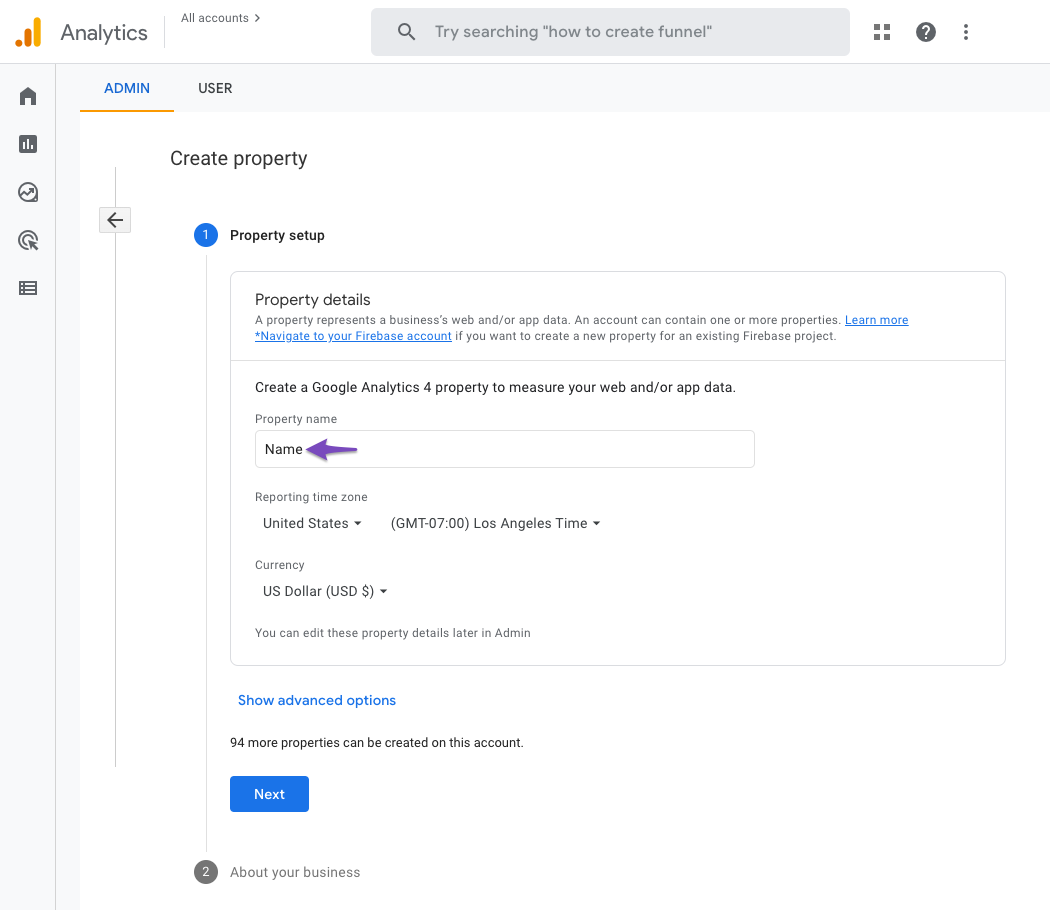
2.3 Navigate to Advanced Options
Once you’ve added the name of the property, choose Show advanced options as shown below.
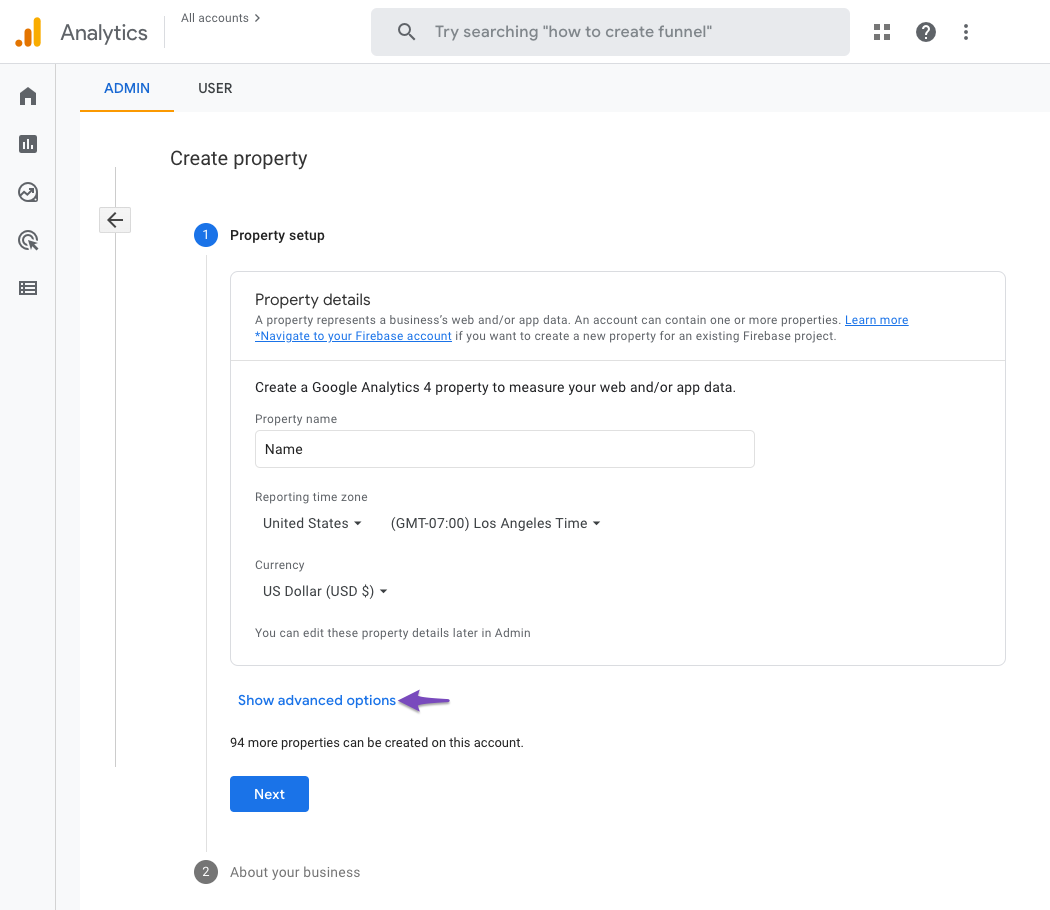
2.4 Enable the Universal Analytics Property
Under the advanced options, click the toggle to enable Create a Universal Analytics property.
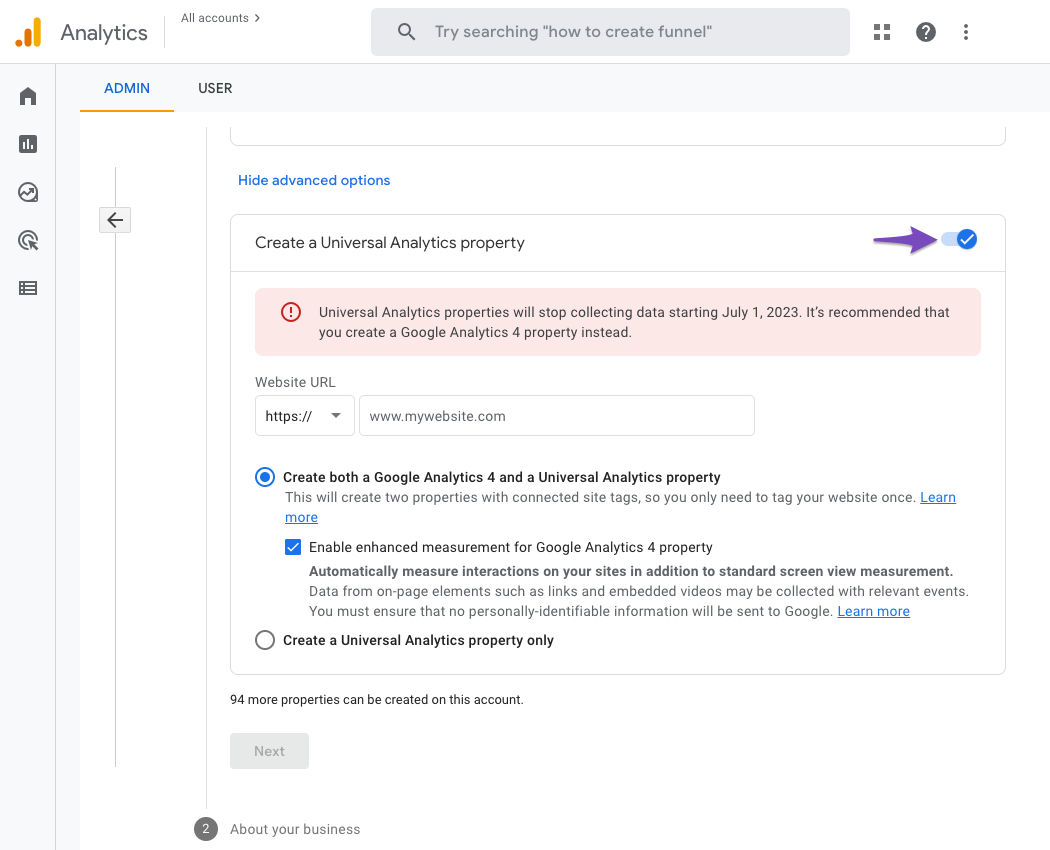
Then enter your website name in the Website URL and then click Next.
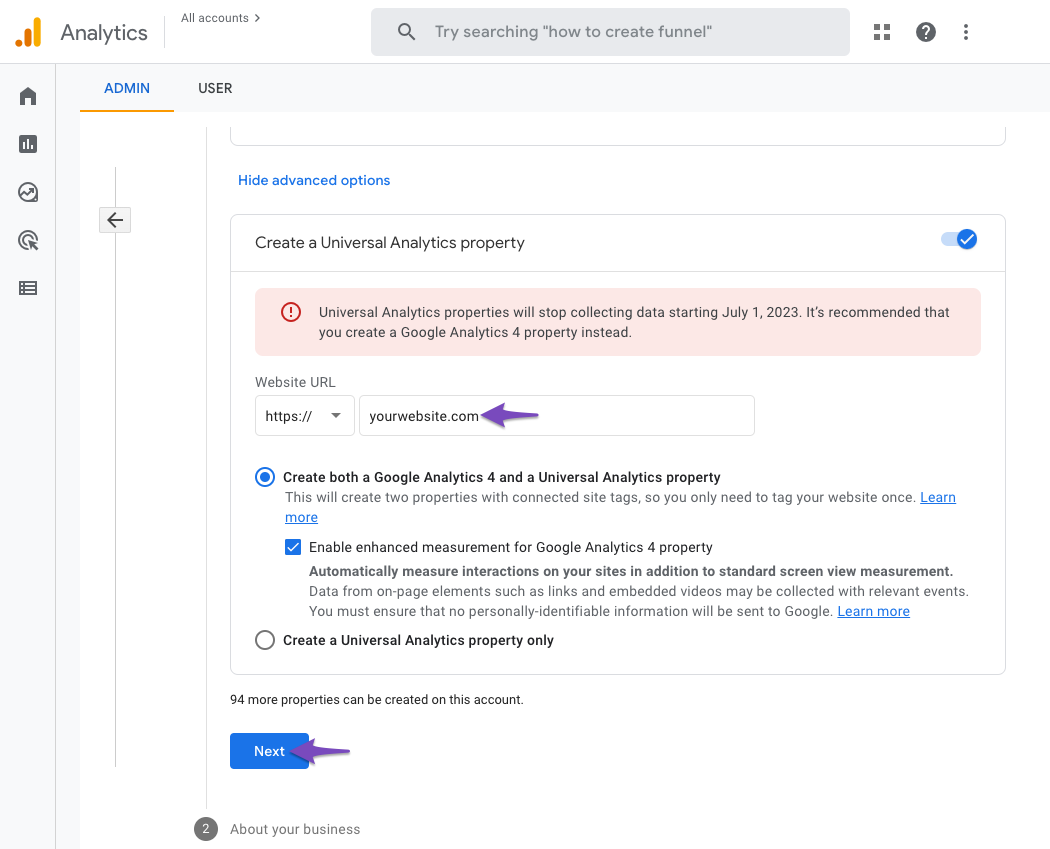
Finally, enter the details of your business (optional) and click Create.
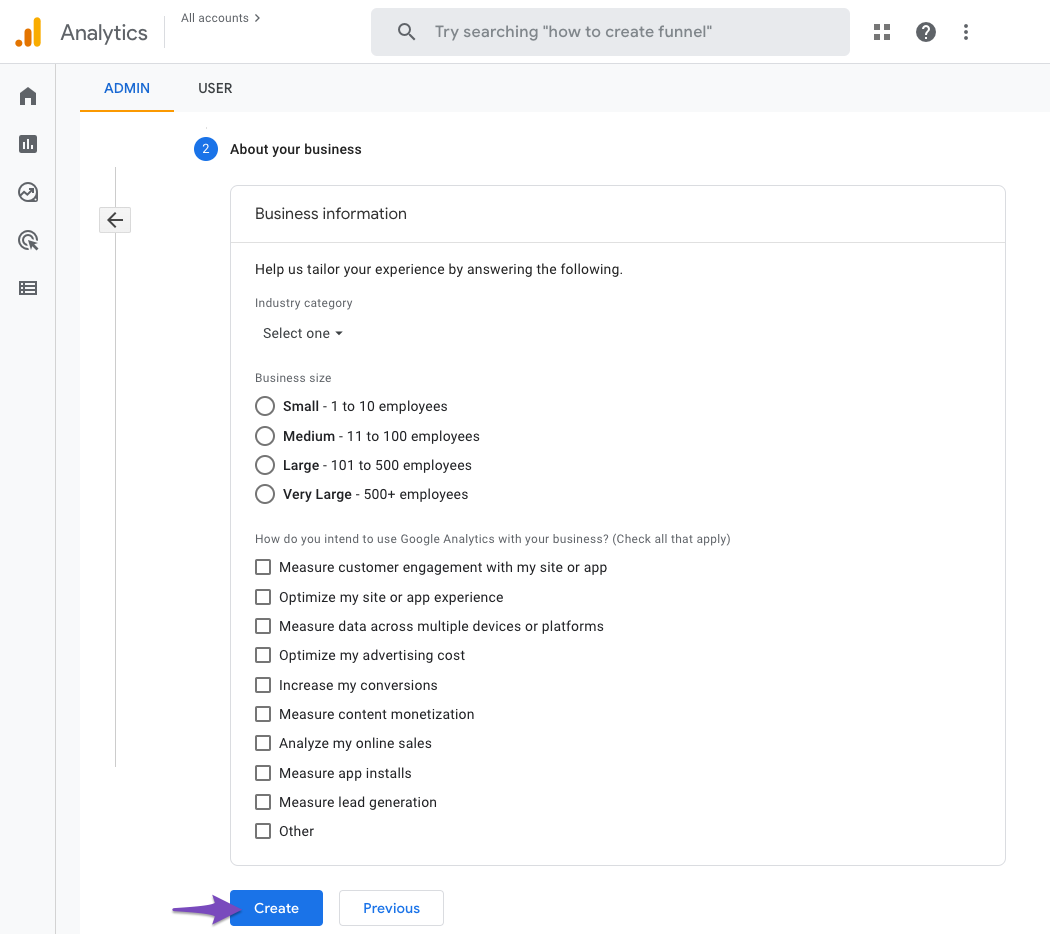
Now you can head over to Rank Math Analytics settings and choose this newly created GA3 property.
To validate that Rank Math has added the Universal Analytics code, head over to your website’s page source code. You can search for a code snippet of the below format to ensure that Rank Math has successfully added the Universal Analytics code.
gtag('config', 'UA-xxxxxxxx', {} );And that’s it! If you still have absolutely any questions about using GA4 with Rank Math Analytics, please feel free to reach our support team directly from here, and we’re always here to help.